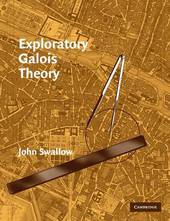
|
Exploratory Galois Theory
Hardback
Main Details
| Title |
Exploratory Galois Theory
|
| Authors and Contributors |
By (author) John Swallow
|
| Physical Properties |
| Format:Hardback | | Pages:222 | | Dimensions(mm): Height 242,Width 200 |
|
| Category/Genre | Algebra |
|---|
| ISBN/Barcode |
9780521836500
|
| Classifications | Dewey:512.3 |
|---|
| Audience | | Tertiary Education (US: College) | | Professional & Vocational | |
|---|
|
Publishing Details |
| Publisher |
Cambridge University Press
|
| Imprint |
Cambridge University Press
|
| Publication Date |
11 October 2004 |
| Publication Country |
United Kingdom
|
Description
Combining a concrete perspective with an exploration-based approach, Exploratory Galois Theory develops Galois theory at an entirely undergraduate level. The text grounds the presentation in the concept of algebraic numbers with complex approximations and assumes of its readers only a first course in abstract algebra. The author organizes the theory around natural questions about algebraic numbers, and exercises with hints and proof sketches encourage students' participation in the development. For readers with Maple or Mathematica, the text introduces tools for hands-on experimentation with finite extensions of the rational numbers, enabling a familiarity never before available to students of the subject. Exploratory Galois Theory includes classical applications, from ruler-and-compass constructions to solvability by radicals, and also outlines the generalization from subfields of the complex numbers to arbitrary fields. The text is appropriate for traditional lecture courses, for seminars, or for self-paced independent study by undergraduates and graduate students.
Author Biography
John Swallow is John T. Kimbrough Associate Professor of Mathematics at Davidson College. He holds a doctorate from Yale University for his work in Galois theory. He is the author or co-author of a dozen articles, including an essay in The American Scholar. His work has been supported by the National Science Foundation, the National Security Agency, and the Associated Colleges of the South.
Reviews'The exploration-based approach to the subject is very down-to-earth, entertaining, motivating, encouraging and enlightening, making the text highly suitable for undergraduate courses, for seminars, or for self-paced independent study by interested beginners.' Zentralblatt MATH
|